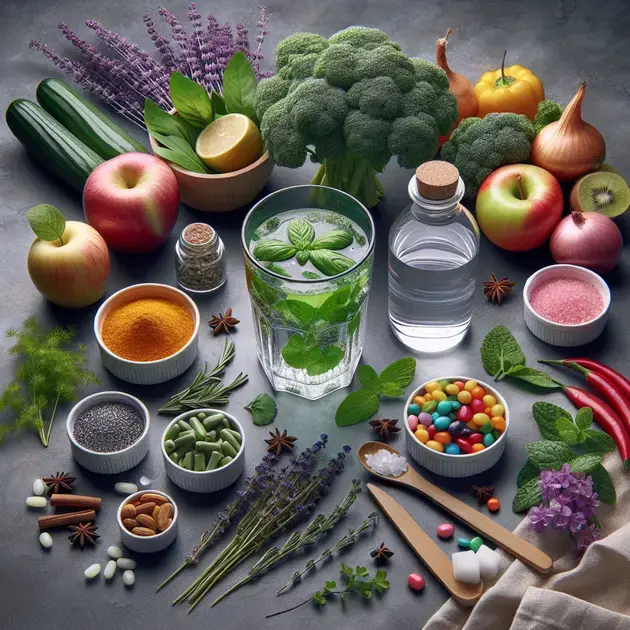Are you tired of dealing with bad breath and the negative effect it can have on your confidence? Don’t worry, you’re not alone. Many people struggle with this common issue, but the good news is that there are effective ways to banish bad breath and boost your confidence.
From practicing good oral hygiene habits to trying out natural remedies, like oil pulling and using peppermint essential oil, there are plenty of options to help freshen your breath and give you the confidence you need to tackle your day. With these simple tips and tricks, you can say goodbye to bad breath and hello to a more confident you.
Practicing Good Oral Hygiene Habits
Good oral hygiene habits are crucial for banishing bad breath and maintaining fresh breath throughout the day. Here are some effective practices you can incorporate into your daily routine:
1. Brushing and Flossing
Brush your teeth at least twice a day with fluoride toothpaste to remove plaque and bacteria that can cause bad breath. Don’t forget to floss daily to clean between your teeth and along the gumline where your toothbrush can’t reach.
2. Tongue Scraping
Use a tongue scraper to gently clean your tongue and remove the buildup of bacteria and debris that can contribute to bad breath. Scrape from the back of your tongue to the front, rinsing the scraper after each pass.
3. Mouthwash
Include an antimicrobial mouthwash in your oral hygiene routine to kill bacteria and freshen your breath. Rinse with mouthwash for 30 seconds after brushing and flossing.
4. Stay Hydrated
Drink plenty of water throughout the day to keep your mouth moist and wash away food particles that can lead to bad breath. Dehydration can contribute to dry mouth, which can worsen halitosis.
5. Regular Dental Check-ups
Visit your dentist for regular check-ups and professional cleanings to maintain good oral health and address any underlying issues that may be causing bad breath. Your dentist can also provide personalized recommendations for your specific oral hygiene needs.
By following these oral hygiene habits consistently, you can effectively banish bad breath and enjoy long-lasting fresh breath.
Natural Remedies to Freshen Your Breath
In addition to practicing good oral hygiene habits, you can also try natural remedies to freshen your breath. These remedies can help combat bad breath and provide a natural, refreshing solution:
1. Chewing Fresh Herbs
Chew on fresh herbs like parsley, mint, or cilantro after meals to help neutralize odors and freshen your breath. These herbs contain chlorophyll, which acts as a natural deodorizer for your mouth.
2. Citrus Fruits
Eat citrus fruits like oranges, lemons, or grapefruits to stimulate saliva production and wash away bacteria in your mouth. The vitamin C in citrus fruits can also help prevent gum disease, another common cause of bad breath.
3. Green Tea
Drink green tea between meals to help fight bad breath. Green tea has natural antibacterial properties that can inhibit the growth of oral bacteria. It also contains compounds that can freshen your breath.
4. Baking Soda Rinse
Mix a teaspoon of baking soda in a glass of water and use it as a mouth rinse to help neutralize odors and freshen your breath. Baking soda can help balance the pH levels in your mouth, creating an inhospitable environment for odor-causing bacteria.
5. Crunchy Fruits and Vegetables
Eat crunchy fruits and vegetables like apples, carrots, and celery to help clean your teeth and stimulate saliva production. These foods can help remove plaque and food particles that can lead to bad breath.
Incorporating these natural remedies into your daily routine can complement your oral hygiene habits and provide a holistic approach to banishing bad breath. With a combination of good oral hygiene practices and natural remedies, you can enjoy long-lasting fresh breath and improved oral health.
**Maintaining a Healthy Diet for Fresher Breath**
Maintaining a healthy diet plays a crucial role in preventing bad breath and promoting overall oral health. Consuming a balanced diet rich in fruits, vegetables, and whole grains can help reduce the growth of bacteria in the mouth, which is a common cause of bad breath. Foods high in sugar and processed carbohydrates can contribute to the production of foul-smelling gases by oral bacteria, leading to unpleasant breath odors. Incorporating foods that are high in water content, such as cucumbers and watermelon, can also help keep the mouth hydrated and reduce the risk of dry mouth, another factor that can contribute to bad breath.
In addition to choosing the right foods, it’s important to pay attention to when and how often you eat. Frequent snacking throughout the day can increase the acidity levels in the mouth, creating an environment where bacteria thrive and cause bad breath. Instead, aim to have balanced meals at regular intervals and avoid eating late at night, as this can also contribute to bad breath. Drinking plenty of water throughout the day can help wash away food particles and bacteria, keeping your mouth clean and fresh.
Incorporating probiotic-rich foods into your diet, such as yogurt and kefir, can also help maintain a healthy balance of bacteria in the mouth and digestive system. Probiotics can help reduce the levels of harmful bacteria that cause bad breath and promote the growth of beneficial bacteria that support oral health. Additionally, chewing sugar-free gum or mints after meals can stimulate saliva production, which can help wash away food particles and neutralize acids in the mouth, reducing the risk of bad breath.
To maintain fresher breath, it’s important to pay attention to both what you eat and how you eat it. By making small changes to your diet and eating habits, you can improve your oral health and enjoy fresher breath throughout the day.
—
**Incorporating Essential Oils for Oral Health**
Essential oils have long been used for their antibacterial and antiseptic properties, making them a popular choice for promoting oral health. Peppermint, tea tree, and clove oils are among the most commonly used essential oils for oral care, as they can help kill bacteria in the mouth, reduce inflammation, and freshen breath naturally. Incorporating essential oils into your oral hygiene routine can help support healthy gums, prevent plaque buildup, and reduce the risk of bad breath.
One of the most effective ways to use essential oils for oral health is through oil pulling. Oil pulling involves swishing a small amount of oil, such as coconut or sesame oil, in your mouth for 10-15 minutes to help remove bacteria and toxins. Adding a few drops of peppermint or tea tree oil to the oil can enhance its antibacterial properties and provide a refreshing flavor. Oil pulling can help reduce plaque buildup, whiten teeth, and improve overall oral hygiene when done regularly.
Another way to incorporate essential oils into your oral care routine is by adding them to homemade toothpaste or mouthwash. Mixing a few drops of essential oil with baking soda and coconut oil can create a natural toothpaste that cleans and freshens the mouth without the use of harsh chemicals. Similarly, adding a few drops of essential oil to water can create a refreshing mouthwash that kills bacteria and freshens breath.
When using essential oils for oral health, it’s important to choose high-quality, food-grade oils and dilute them properly to avoid irritation. By incorporating essential oils into your oral hygiene routine, you can support healthy gums, prevent bad breath, and enjoy a naturally fresh and clean mouth.
—
**The Link Between Water Intake and Bad Breath**
Water intake plays a significant role in maintaining good oral health and preventing bad breath. Staying hydrated helps stimulate saliva production, which is essential for washing away food particles, neutralizing acids, and maintaining a healthy balance of bacteria in the mouth. Dehydration can lead to dry mouth, a condition in which the mouth produces less saliva, creating an environment where bacteria thrive and cause bad breath. By drinking an adequate amount of water throughout the day, you can help keep your mouth hydrated and reduce the risk of dry mouth and bad breath.
In addition to promoting saliva production, water can also help wash away food particles and bacteria that can lead to bad breath. Swishing water around in your mouth after meals can help dislodge food particles stuck between teeth and neutralize acids that can cause odors. Drinking water throughout the day can also help remove bacteria and debris from the surface of the tongue, another common source of bad breath.
Including foods with high water content, such as fruits and vegetables, in your diet can also help increase your overall water intake and support good oral health. Cucumbers, watermelon, and celery are excellent choices for hydrating the body and promoting saliva production. By making a conscious effort to stay hydrated and incorporate water-rich foods into your diet, you can help reduce the risk of bad breath and support a healthy mouth.
Conclusion
Healthy dietary choices, such as consuming a variety of fruits, vegetables, whole grains, and probiotic-rich foods, play a vital role in maintaining fresher breath and promoting optimal oral health. These foods help reduce the growth of bacteria in the mouth, prevent plaque buildup, and support a healthy balance of oral bacteria, ultimately contributing to better breath quality.
Additionally, incorporating essential oils like peppermint, tea tree, and clove into your oral hygiene routine can further enhance oral health by leveraging their antibacterial properties to kill harmful bacteria, reduce inflammation, and freshen breath naturally. Practices such as oil pulling with high-quality oils and making homemade toothpaste or mouthwash with essential oils can significantly improve oral hygiene and combat bad breath effectively.
Moreover, the importance of water intake in preventing bad breath should not be overlooked. Staying hydrated aids in saliva production, which is crucial for washing away food particles, neutralizing acids, and maintaining a healthy oral environment. By swishing water in the mouth after meals and incorporating water-rich foods like cucumbers and watermelon into the diet, individuals can support good oral health, reduce the risk of dry mouth, and enjoy fresher breath throughout the day.

